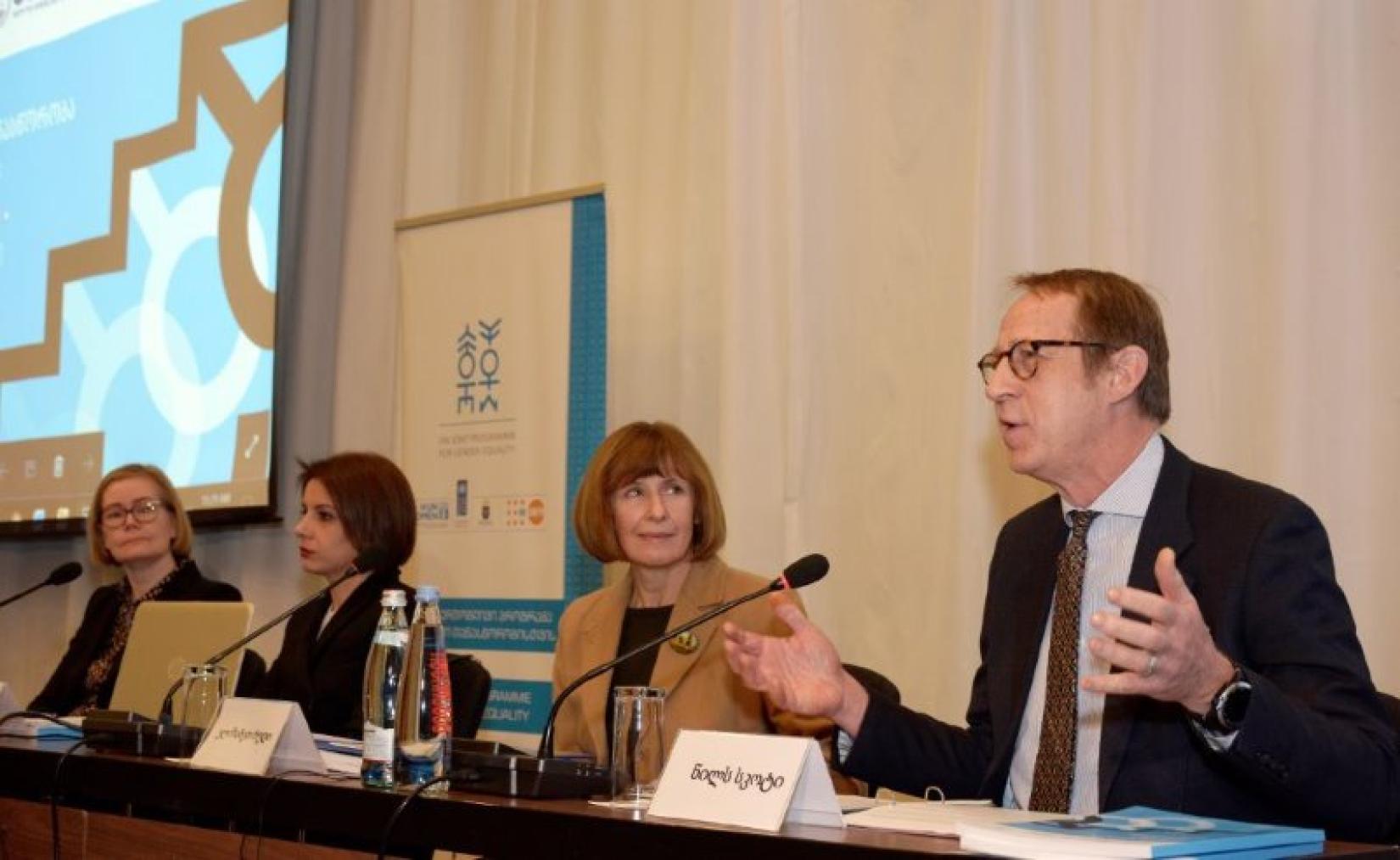Georgian Parliament unveils first comprehensive review of gender equality legislation and policies
30 January 2018
- The Georgian Parliament's review of gender inequality in legislation and policy recommends policy and legislative changes to help stop sexual harassment and violence against women, effectively fight discrimination, increase women's participation in government, and economically empower women, among other reforms.

Nine fields of Georgia’s legislation and policy were analysed for their compliance to the principles of gender equality. The baseline research Gender Equality in Georgia: Barriers and Recommendations was carried out by the Gender Equality Council of the Parliament of Georgia with support from the United Nations Development Programme (UNDP) and Government of Sweden, under the UN Joint Programme for Gender Equality, and the United States Agency for International Development (USAID) and East-West Management Institute, under the USAID-funded initiative Promoting Rule of Law in Georgia (PROLoG).
Key findings of this comprehensive study were released on January 30, 2018, at a conference attended by representatives of the Georgian Government, Parliament, civil society and international organizations.
Tamar Chugoshvili, First Vice Speaker and Chairperson of the Gender Equality Council of the Parliament of Georgia; Martina Quick, Ambassador of Sweden to Georgia; Elizabeth Rood, Deputy Chief of Mission at the U.S. Embassy in Georgia; and Niels Scott, Head of the United Nations in Georgia, addressed the participants with opening remarks.
The research is based on the previous reports and studies undertaken by international and national organizations in Georgia, as well as on the interviews and data provided by authorities. A team of researchers analysed Georgia’s international human rights obligations and international best practices to identify legislative and policy gaps and set concrete recommendations for advancing gender equality agenda in the areas of political participation, economic empowerment, violence against women, labour relations, health, education, sports, culture, and peace and security.
Some key recommendations of the study refer to the amendments to the Gender Equality Law, Anti-Discrimination Law, Criminal Code, Election Code, Labour Code and Law on the Public Defender. Policy recommendations are particularly important in closing gender gaps in education, women’s economic advancement, protection of sexual and reproductive rights of women and girls, and advancing gender equality in sports and culture.
The recommendations target key national agencies responsible for gender equality in Georgia, including the Gender Equality Council of the Parliament and the Inter-Agency Commission on Gender Equality, Violence against Women and Domestic Violence, which operates under the Government.
“Legislation and policies alone are not enough to close gender gaps. However, their revision is a constructive step forward to achieve meaningful equality between women and men in all spheres of life as well as to prevent systemic discrimination against women. We hope that the findings and recommendations of this research will lay the ground for effective measures against sexual harassment, domestic violence and violence against women, as well as for increasing political participation of women through temporary mandatory gender quotas,” said Niels Scott, Head of the United Nations in Georgia.
The presentation of the study was followed by a discussion on the new Gender Equality Concept of Georgia, a revised version of the previous document adopted in 2006. The new Concept was drafted based on the findings of the research and then reviewed by the USAID/PROLoG experts. The Parliament of Georgia is expected to adopt a new Concept for Gender Equality during the Spring 2018 session.
“The United States government is committed to supporting gender equality. Ending gender-based violence and sexual harassment, effectively fighting discrimination, and economically empowering women are priorities of the U.S. government, and we are proud to support the Government of Georgia's efforts to reduce gender inequalities in Georgia through legislative reform and a modified State Concept,” said Elizabeth Rood, Deputy Chief of Mission at the U.S. Embassy in Georgia.
The Gender Equality Council also presented its 2018-2020 Action Plan revealing key priorities of the gender equality agenda of the Parliament of Georgia.


